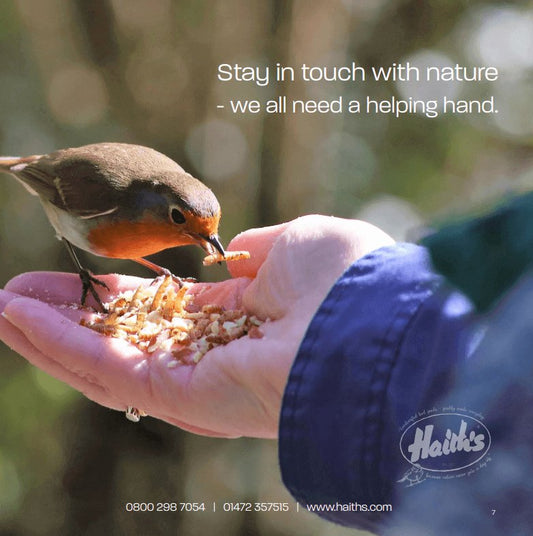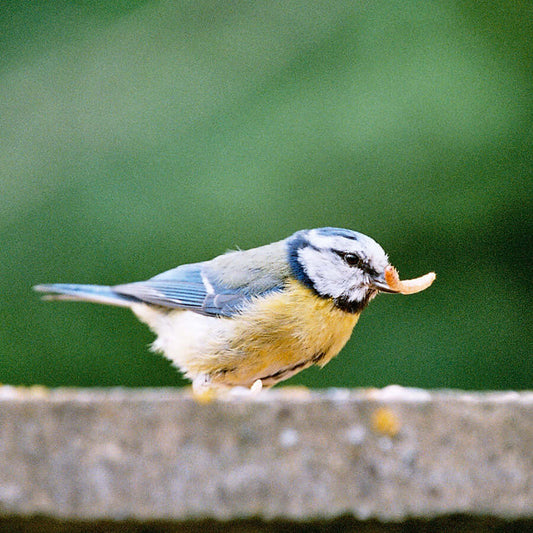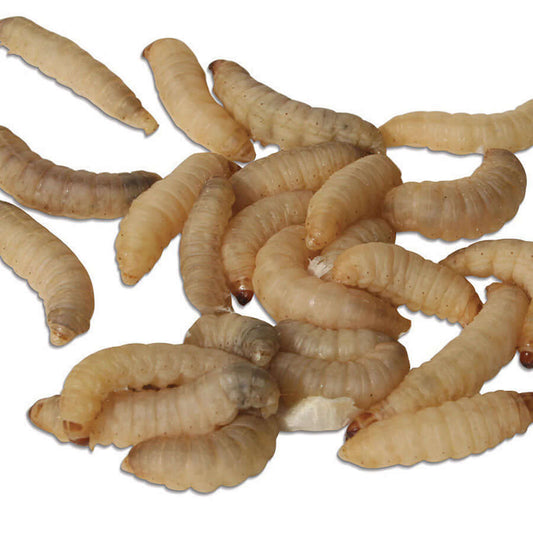Why Insects Are Important to Wild Birds

When most people think about feeding birds, they picture seeds, peanuts, suet balls, or perhaps a handful of mealworms tossed onto the lawn. But while these offerings are valuable, especially in colder months, it’s easy to overlook a crucial natural food source that birds have relied on for millions of years: insects. From robins pulling earthworms from the soil to blue tits darting through the air to catch flying insects, bugs are at the heart of many birds' diets. In fact, for countless bird species, insects are more than just food - they are essential to survival, specially during the breeding season.
So why are insects so important to wild birds? Let’s dig in.
-

Insects: A Powerhouse of Nutrition
Insects are nature’s perfect snack for birds. They are rich in protein, fat, and other nutrients that birds need to thrive. This is particularly vital during the spring and summer months when adult birds are raising chicks. Nestlings grow at an astonishing rate and need protein-rich diets to develop feathers, muscles, and strong bones. Insects, especially caterpillars, are soft, abundant, and packed with the protein young birds require. Take the great tit, for example - research has shown that a single brood of great tit chicks may consume over 10,000 caterpillars before they fledge! That’s a lot of bug-hunting for two small, hardworking parents.
-

Vital During Breeding Season
While adult birds can eat a range of foods - from berries and seeds to suet and worms - chicks are far more limited. Their soft beaks and fast-growing bodies demand a steady supply of soft-bodied insects. This is one reason why many birds time their nesting to coincide with the annual explosion of insect life in late spring. If insect numbers are low due to cold weather, pesticide use, or habitat loss, birds may struggle to find enough food for their young. This can lead to fewer chicks surviving or fledging underweight and vulnerable. So even if adult birds look well-fed, low insect numbers can spell disaster for the next generation.

A Key Part of the Food Chain
Insects don’t just feed birds. They are a central part of the food chain, supporting animals from frogs and hedgehogs to bats and foxes. For birds, insects like beetles, flies, ants, spiders, and grubs form a diverse and plentiful menu. Even birds we associate with seeds or nectar - like goldfinches or dunnocks - often rely on insects to raise their young. And it’s not just the obvious insectivores like swifts, swallows, and warblers. Blackbirds, wrens, robins, and thrushes all rely heavily on insects, especially during the breeding season. Without insects, bird populations can decline rapidly. In fact, some recent studies across Europe have shown shocking drops in both insect and bird numbers - two trends that go hand in hand.
-

Insects Keep Birds Busy
Watching birds forage for insects is one of the true pleasures of a garden or woodland walk. From the blackbird flipping leaves in search of beetles, to the long-tailed tit acrobatically picking aphids from branches, these natural behaviours give us insight into a bird’s daily life. Feeding on insects isn’t just about nourishment - it’s also about skill. Birds that feed on flying insects, such as swifts and house martins, are extraordinary fliers, capable of dazzling aerial manoeuvres. Treecreepers and nuthatches show remarkable agility as they work tree trunks for hidden spiders and larvae. Supporting insect life means supporting these incredible displays of natural behaviour.
-

Insects Are in Trouble
Sadly, insect populations across the UK and Europe are under serious threat. Intensive farming, widespread use of pesticides, habitat destruction, light pollution, and climate change are all contributing to what scientists are calling an “insect apocalypse.” In turn, birds that depend on insects - especially those that migrate to breed here in summer - are facing harder times. Fewer insects mean less food, lower breeding success, and declining bird numbers. Species like the spotted flycatcher, willow warbler, and nightingale have all seen significant population drops in recent decades. Many conservationists believe that restoring insect populations is key to saving these birds.
The good news is there’s plenty you can do to support insects - and the birds that depend on them.
Garden for Insects
- Plant native flowers and wildflowers that provide nectar for bees, butterflies, and other pollinators.
- Avoid using pesticides or herbicides. Even “natural” sprays can harm beneficial insects.
- Let a corner of your garden grow wild -longer grass, nettles, and brambles are havens for insects.
Create Insect Habitats
- Build or buy a bug hotel to give insects a safe place to overwinter.
- Leave dead wood, stones, or leaf piles in your garden. These create excellent shelter for beetles, spiders, and other invertebrates.
- Keep a small pond or water source. Many insects, such as dragonflies, need water to breed.
Feed Birds Insects Too
- Offer dried mealworms or live insects (especially in spring) on bird tables or in feeders.
- Soak dried mealworms in warm water to make them easier for chicks to digest.
- Suet products with added insects can give birds a boost during nesting or moulting.

By boosting insect numbers in your garden or green space, you’ll be helping to support a wide range of wildlife - not just birds, but also hedgehogs, frogs, toads, and bats.
-
Dried Mealworms for wild birds
Vendor:HAITH'S to HOME5.0 / 5.0
(35) 35 total reviews
Regular price From £6.29 GBPRegular priceUnit price / per£6.29 GBPSale price From £6.29 GBP -
Live Mealworms for wild birds
Vendor:HAITH'S to HOME5.0 / 5.0
(12) 12 total reviews
Regular price From £19.95 GBPRegular priceUnit price / per£19.95 GBPSale price From £19.95 GBP -
Waxworms for garden birds
Vendor:HAITH'S to HOME5.0 / 5.0
(3) 3 total reviews
Regular price From £19.95 GBPRegular priceUnit price / per£19.95 GBPSale price From £19.95 GBP
Insects may be small, but their importance to wild birds cannot be overstated. They provide crucial protein for growing chicks, vital nutrients for adult birds, and support complex ecosystems that have evolved over millennia. If we want to continue enjoying the beauty and song of our favourite garden birds, we need to look after the insects they depend on.
So next time you see a ladybird crawling on a leaf or a bee buzzing between flowers, spare a thought for the birds - because every insect saved is a meal for a chick, and a step towards a healthier, more balanced natural world.







